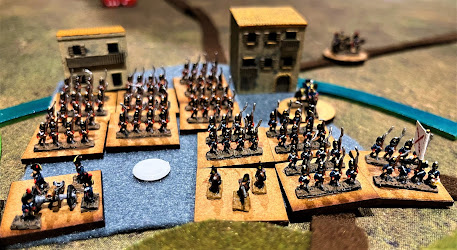I know very little about Napoleon's invasion of Spain in 1808 and don't remember ever hearing of Tudela before. (A search of TMP to see how often others have gamed it found just one report of it being fought on a 12'x7.5' table over a weekend of 'two solid days of gaming', a commitment of time and space that is both metaphorically and physically beyond the reach of most of us!) This was a decent-sized clash of 35,000 French on their way to Madrid attacking 45,000 Spanish trying to defend a river line. The Spanish forces are divided, in or arriving at two towns, Tudela and Cascante, that anchor the ends of the line. They need to move towards each other and fill the gap. Meanwhile Marshal Lannes has seen the opportunity to defeat the Spanish in detail by pouncing on one Spanish force while fending off the other.
Four of us fought this at Mark's house in two and a half hours. It was so intense and absorbing, I didn't take any photos during the actual game, but I can give a brief synopsis and some reflections.
The French right (Mark) and Spanish left (Dave) start further apart, arrive gradually and, in the Spanish case, are not allowed to move initially. The action therefore kicked off on the French left, commanded by me, facing Crispin's Spanish. He pushed north onto the heights to delay me as well as marching troops west to fill the gap in the Spanish centre. I soon kicked him off the Cerro de Barbara above Tudela, then shifted my weight right to push across the Rio Quieles.
Over the next few turns, the quality of the French army told. Mark advanced rapidly, seized two objective villages, and got a dragoon brigade across the river in the centre. Meanwhile I drove the Spanish off the nearest height west of Tudela, isolating a Spanish division on the further one.
So many of the poor Spanish units were now spent or destroyed that Crispin was reeling. We were confident of smashing the isolated ones in the centre to take that objective, and perhaps even storm Tudela, for a more than sufficient victory. A counter-attack by Dave retook one of the villages, though, making things a little more difficult. In classic BBB fashion, then, several objectives were in play on the final turn, with all three results very much possible.
Dave sent a cavalry raid to seize another village, but this was repulsed by French artillery. Mark stormed Urzante, which changed hands yet again. My assault on Tudela was repelled by the Spanish guns. Could I take the central height? The cavalry let us down (my cuirassiers still rallying from a previous charge, the dragoons failing to move at all), so my infantry went in unsupported, pushing the Spanish back but not enough to claim the hill.
The result? An honorable and very satisfying draw. A big thank you to Mark for designing a great scenario and laying on such an exciting game.
Reflections
It felt Napoleonic. As with our Borodino game over Christmas, I enjoyed the feeling of making grand tactical decisions, shifting whole divisions to move the point of attack.
Ideal as a four-hander! The battle divides naturally into two halves so we players could pair off.
History in action. I knew nothing about Tudela. Now I am quite well acquainted with it. A week later, Napoleon was in Madrid.
Player morale: for the last few turns, as one Spanish milita unit after another disintegrated and fled to hide among the olive groves, Crispin was obviously feeling more and more beleaguered. He took it in good spirit, but it was quite amusing to watch. Anyway, his tenacious defence was justly rewarded in the end.
Movement makes the game. Both sides had to manoeuvre, there was plenty of space to do so, the terrain was just complex enough to make decisions interesting. Arrival of reinforcements contributed to the changing situation and the need to manoeuvre.
Super good fun! A fast-moving battle, plenty of ebb and flow (Urzante changing hands three times), nice mix of troops, well-designed victory conditions that produced an exciting finish.


Sounds like and excellent game and scenario Chris:).
ReplyDeleteYep, got lucky again, Steve. We don't seem to play too many duff ones!
DeleteI have played it twice with Mark. It's a cracking game - my first one I lost but the second I managed to slip my cavalry through the centre and then round the back of the Spanish line.
ReplyDelete